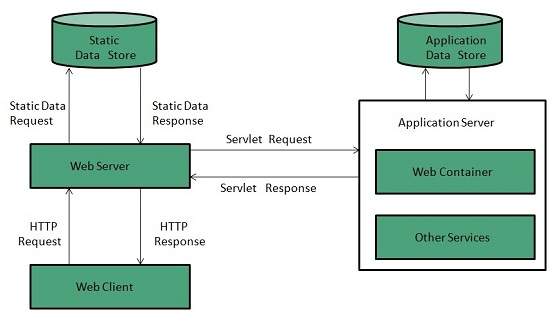What is a Web Server?
A website’s content is stored and delivered with the help of a web server. Web pages are a collection of data, including images, text files, hyperlinks, database files etc., all located on some computer (also known as server space) on the Internet.
A web server communicates with a web browser using the Hypertext Transfer Protocol (HTTP). The content of most web pages is encoded in Hypertext Markup Language (HTML). The content can be static or dynamic. To deliver dynamic content, most web servers support server‑side scripting languages to encode business logic into the communication. Commonly supported languages include ASP, Javascript, PHP, Python, and Ruby.
Web Servers also assists in emailing services and storing files. Therefore it also uses SMTP (Simple Mail Transfer Protocol) and FTP (File Transfer Protocol) protocols. Web servers are mainly used in web hosting or hosting the website’s data and running web-based applications.
How it work?
Web server software is accessed through the domain names of websites and ensures the delivery of the site’s content to the requesting user.

The hardware of the web servers are connected to the web and supports the data exchange with different devices connected to the Internet. It controls how web users access the web files and ensures the supply of website content to the end-user. Whenever any web browser, such as Chrome, Firefox requests for a web page hosted on a web server, the browser will process the request forward with the help of HTTP. At the server end, when it receives the request, the HTTP server will accept the request and immediately start looking for the requested data and forwards it back to the web browser via HTTP. Multiple domains also can be hosted on one web server.
Web servers are mostly used for:
- Sending and receiving emails
- Downloading requests for File Transfer Protocol (FTP) file
- Building and publishing webpages.
The most leading web servers available today:
- Apache HTTP Server -> It is an open-source, accessible web server available for almost all operating systems. It is developed by Apache Software Foundation.
- Microsoft Internet Information Services (IIS) -> This webs server is tightly integrated with Microsoft operating system; therefore, it is not open-sourced.
- Nginx -> A popular open source web server for administrators because of its light resource utilization and scalability.
- Lighttpd -> A free web server that comes with the FreeBSD operating system. It is seen as fast and secure, while consuming less CPU power.
- Sun Java System Web Server -> A free web server from Sun Microsystems that can run on Windows, Linux and Unix. Though Sun Java is free, it is not an open-source web server.
